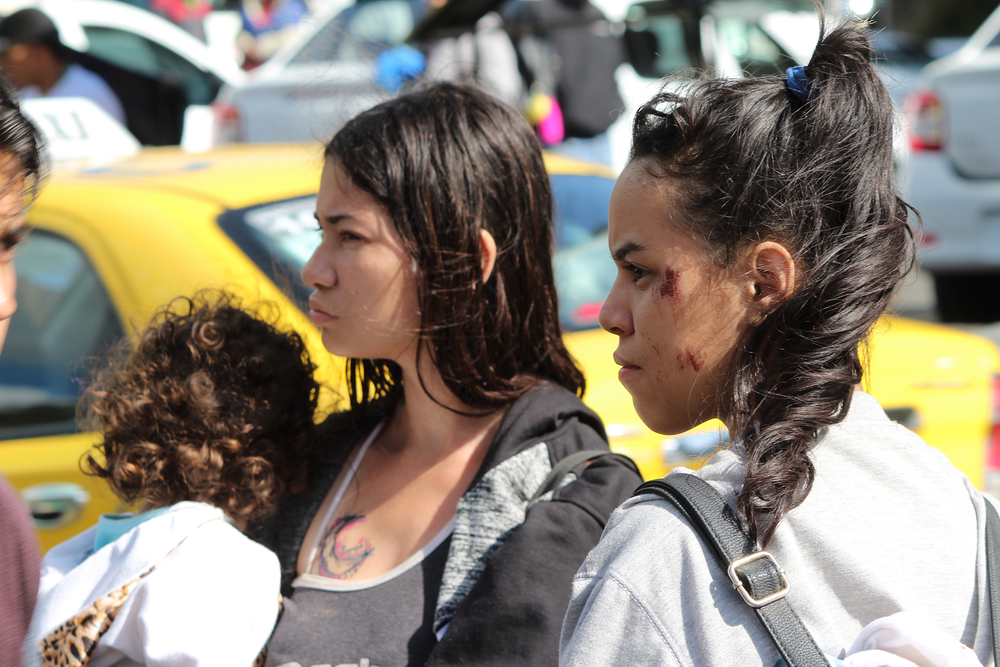Note: The report published by OCHA mentioned in this statement has since been corrected.
The Civil Society Organizations that work in the field of HIV in Venezuela “express their profound worries and disagreements” to the informations and data presented by the permanent representatives of the agencies of the United Nations in Venezuela, especially of the Office for the Coordination of Humanitarian Affairs (OCHA) and El grupo de coordinación intersectorial ÚNETE, (Inter sector Coordination group,UNETE), regarding the delivery of 10,000,000 medicines for HIV treatment in collaboration of the ONGs work in HIV in Venezuela.
The report of such agencies of the United Nations expresses, in addition, the lack of knowledge of the real and actual situation of the distribution of Antiretroviral Therapy and the context that surrounds people who live with HIV in all its vulnerable groups such as young boys and girls, adolescents, women, men who have sex with other men, trans people, disabled people, pregnant and breastfeeding women, inpatients who have HIV, and many others, who are all affected in the current Complex Humanitarian Emergency that Venezuelans suffer.
Hereunder, the Pronouncement emitted by the ONGs in Venezuela is presented to you:
Pronouncement to the Public Opinion
The United Nations is Incoherent with the Reality of HIV in Venezuela
La Red venezolana de gente positiva-RVG+ (The Venezuelan Network of Positive People) and the Coalición de ONGs del interior del país-COVIP, (Coalition of NGOs of the Country’s Interior) expresses its profound worries and disagreement with the information provided by the United Nations Office for the Coordination of Humanitarian Affairs (OCHA) and the Inter sector Coordination group UNETE, on their report of January and April of 2019 published on May 2019, where they stated verbatin:
10 million medicines were distributed for the treatment of HIV, which guaranteed the treatment of 50,000 people for three months in the 24 states, in collaboration with Organización Panamericana de la Salud-OPS (Pan American Health Organization)/Organización Mundial de la Salud-OMS (World Health Organization), Ministerio del Poder Popular para la Salud-MPPS (Ministry of People’s Power for Health) and organizations of civil society.
The Organizations of the Civil Society refute the Resident Coordinator of the United Nations, due to the fact that we have never contributed to a situation that does not exist.
In fact, only 3,659 people with HIV have received the combined antiretroviral Tenofovir, Lamivudine, Dolutegravir (TLD) from midFebruary until April 2019, with a total of 680,000 bottles that were donated by The Global Fund battle against AIDs, tuberculosis, and malaria in December of 2018. These medications are still located within the storage of the Ministry of Health.
We consider that the information provided by the United Nations is incoherent with the reality of HIV in Venezuela, given that in our monitoring performed from November of 2018 to April of 2019, people with HIV were victims of ART shortages that exceeded 70% in all of the country.
In the following we present some evidence that shows the cruel reality of the lack of access for treatments antiretrovirals in Venezuela:
- Children without HIV treatment: 17% of children of up to 14 years old with HIV did not receive antiretrovirals in 7 states, with approximately a total of 2,100 children with HIV who need it nationally. These states are Aragua, Bolivar, Carabobo, Distrito Capital, Lara, Portuguesa, and Tachira.
- 500 girls and boys were born with HIV in 2016: It is estimated that for every 10 pregnant women who have HIV, 7 are forced to natural birth, they won’t perform cesareans due to HIV discrimination, and because of the biosafety kits required by the health public centers.
- Without HIV reactants: There have not been reactants of CD4 counts and viral loads for 4 years. There has not been genotype reactants (viral resistance) for 6 years. A migration of thousands of people with HIV was initiated to do TLD therapy without the test of a viral load, therefore, no clinical evidence exists that proves that this medication achieves its purpose.
- Syphilis out of control: There are no test to detect syphilis and 100% shortages of penicillin of 2,400,000 units, neither 1,200,000 units and neither penicillin for pediatric use.
- Abandoned transportation fleet: They rely on two units of transportation to distribute antiretrovirals in 37 pharmacies throughout the 24 Venezuelan states.
- 3,930 pregnant women with HIV have been attended between 2007 and 2016: During pregnancy, women with HIV were being treated with no accordance to side effects which do not guarantee adherence and intolerance, like the case of the antiretroviral Viraday. They do not have access to the recommended treatment by the OMS like Lopinavir + Ritonavir (Kaletra) + Zidovudine + Lamivudine, which has to be ensured through the public health system.
- Expired Antiretrovirals: In the hands of the Health Department, 6 types of antiretrovirals for pregnant women and children expired, which were Lopinavir + Ritonavir (Kaletra), Abacavir + Lamivudine, Ritonavir, Darunavir, and Zidovudine. Zidovudine expired for adults with HIV. In 2018 these medications were in good condition and donated by AID FOR AIDS, OPS, UNICEF, and the governments of Brazil and Haiti for the people suffering from HIV in Venezuela.
- Absence of specialist: A total of 9 consultations don’t count with medical specialists in HIV in Amazonas, Delta Amacuro, Lara, Merida, Monagas, Nueva Esparta, Portuguesa, Trujillo, and Yaracuy. With a total of 380 medics, 54 (14%) emigrated in 2018.
- No public management: The National Program of AIDS does not have HIV medical specialists nor personnel with experience to conduct the public policy regarding HIV in Venezuela, within a full complex humanitarian emergency.
- Privatized Health: People with HIV are obligated to buy medications for treatment of opportunistic infections associated with AIDS, and clinical materials and supplies, since public health centers are not properly endowed.
Major sanitary authorities deny having conversations with civil society since February of 2019 in order to implement the Master Plan for the fortification of the response to HIV/AIDS, tuberculosis, and malaria in the Republican Bolivarian of Venezuela from the perspective of public health. This was agreed upon in 2018.
In view of the previous, we demand a public explanation and the correct information from the Office of the Resident Coordinator in Venezuela, from the Office for the Coordination of Humanitarian Affairs, and from the Group of Inter sector Coordination UNETE, since their incorrect announcements have created false hope in more the 80,000 people with HIV in Venezuela, in regards to the supply of antiretrovirals for HIV and AIDS, a health condition of great emotional impact, that caused so many deaths that could have been avoided, if the United Nations would have acted on time to protect the population from facing this humanitarian crisis that Venezuela is suffering.
Subscribed by:
- General Secretariat and the Board of Directors of Venezuelan Network of Positive People (RVG+)
- Coalition of ONGs of the Country’s Interior (COVIP)
- Solidarity Action
- ACCSI Citizen Action Against AIDS
- ACIVA Aragua Vital Impulse Civil Association
- ACOVIH
- ADHAM
- AID FOR AIDS Venezuela
- AMAVIDA
- ASOMUVID
- AZUL +
- Chair of Peace
- Conscience for Live
- Rainbow Foundation for Life
- Isamar Foundation
- MAVID Foundation
- Fundapema
- Fundasidarta
- Great Family for Health
- Rebirth Group
- Positive Footprints
- Positive Lara
- New Life
- ONG Fenix
- Organization STOP HIV
The Mavid Carabobo Foundation is a Non-Governmental Organization (NGO), non-profit, consisting mostly of people living with the Human Immunodeficiency Virus (HIV), family members, health personnel, and with the support of specialized personnel (Physicians Infectológos, Immunologists, Psychologists, among others). The Foundation aims to contribute to the counselling of people living with HIV, through workshops and self-support groups, prevention and other activities.




